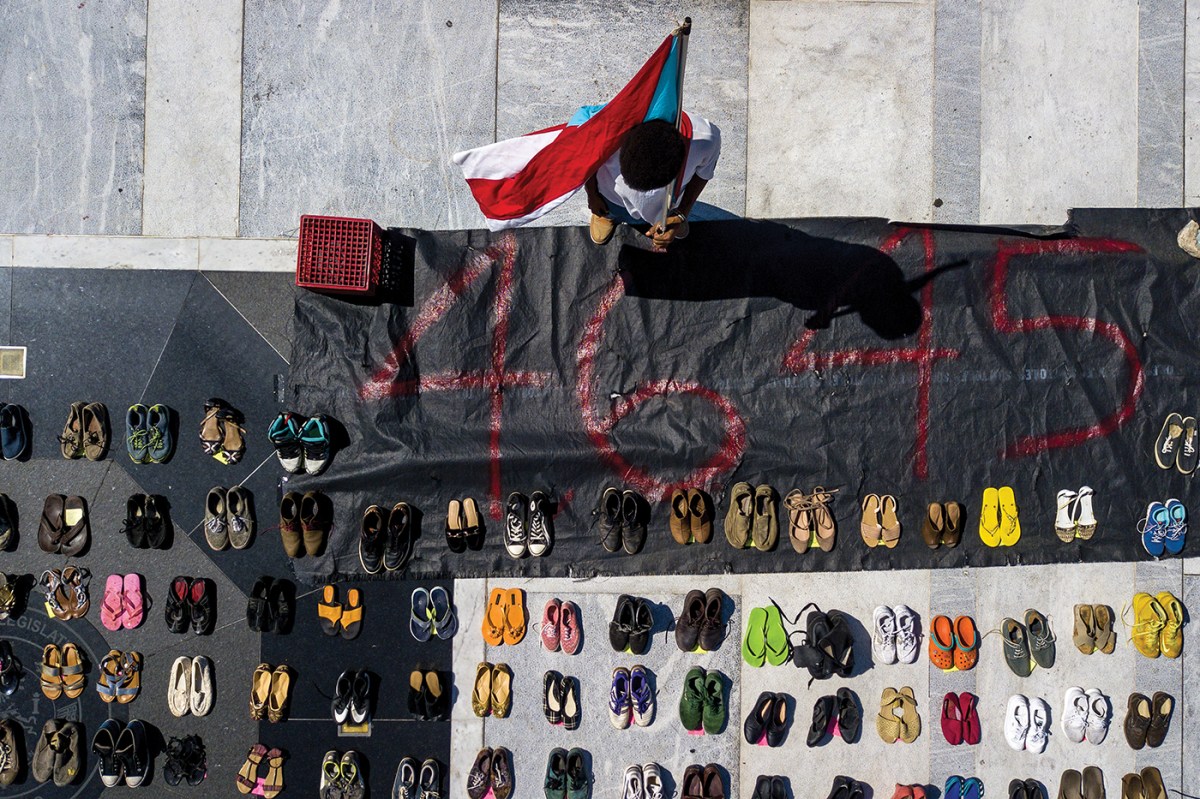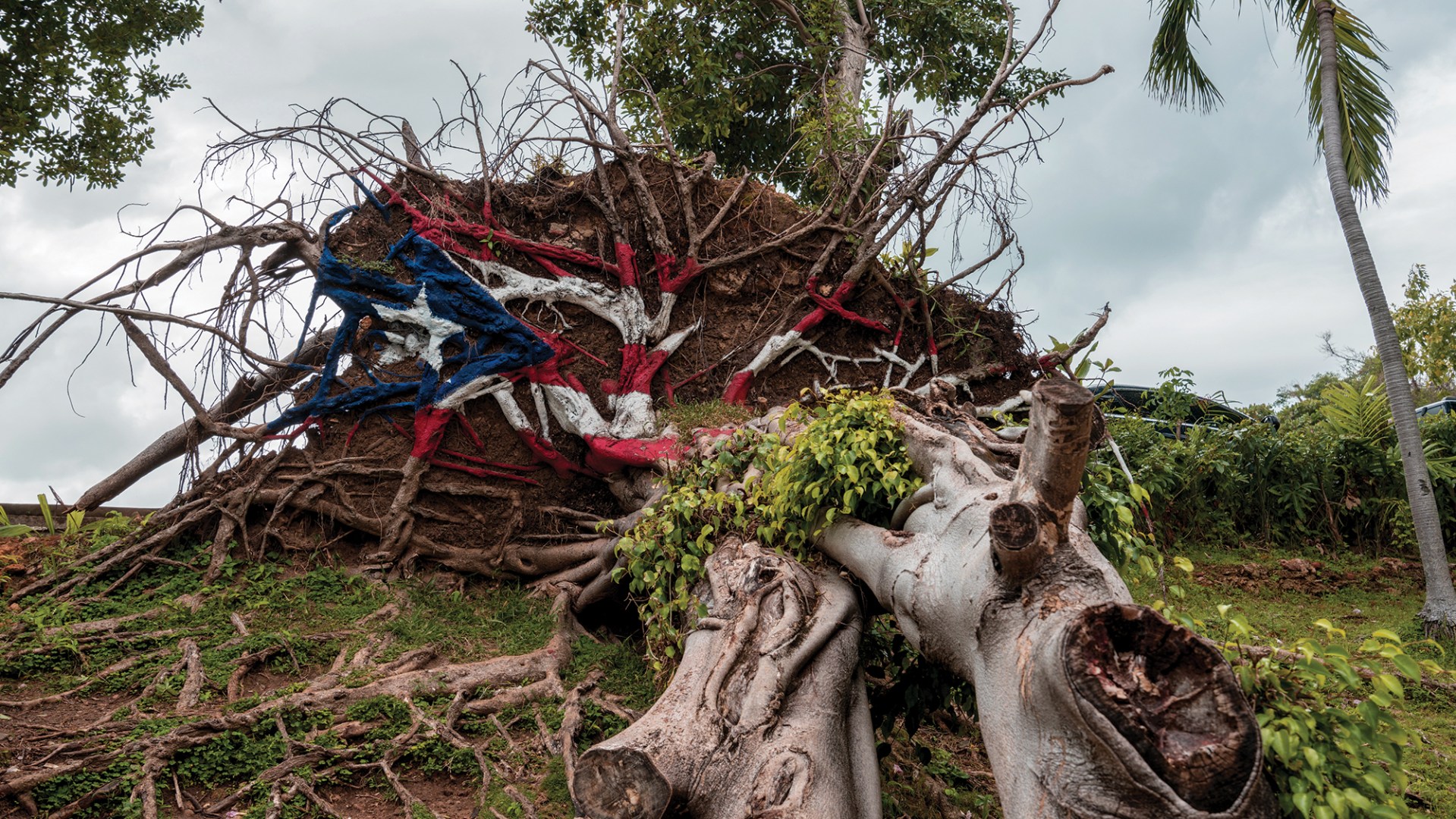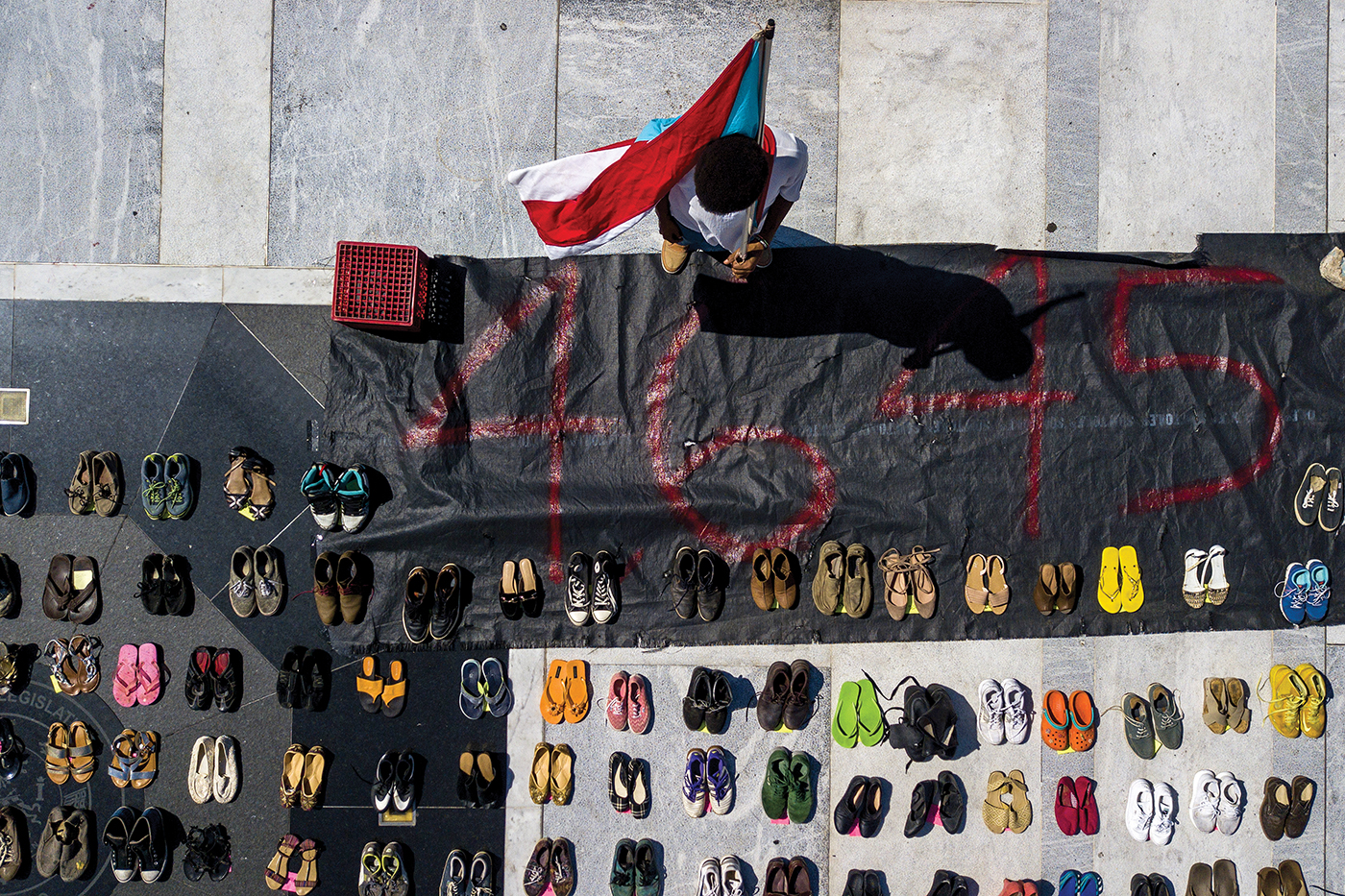Editor’s note: This story has been updated since it was first published in the September 2018 print edition of CT. On August 9, the Puerto Rican government released a report estimating the number of deaths in the country rose by at least 1,400 after Hurricane Maria, but noted that the official death toll attributable to the storm remained at 64.
Puerto Rico is a tropical paradise—home to 3.5 million American citizens, an impressive mountain range, white sand beaches, and the only tropical rainforest in the United States.
It is beautiful, and it is in disarray.
From 2000 to 2017, the island suffered one financial blow after another: Congressional tax grants expired, the pharmaceutical industry moved overseas, the US housing bubble collapsed, and Puerto Rico was left with a mammoth debt and no means to repay it.
Then Hurricane Maria came.
The devastation that the almost–category 5 monster brought to the island is unimaginable. The system crisscrossed from southeast to northwest, flattening everything in its path. The aftermath of the event—with the months-long loss of electrical power, communications, and water supply, as well as destroyed roads and closed ports—claimed at least 64 lives (as per the government official figures) and as many as 4,600 (as per a Harvard University study), the majority of them senior citizens with medical conditions living in the inaccessible mountain ranges.
And that’s just the physical impact. The church in Puerto Rico and the spiritual lives of its citizens have not been spared of all of this pain and desolation, but their story is still one of grace and love overcoming loss and suffering.
During those first few days, we pastors were in shock. What would happen with our families? What would happen with the communities of faith we ministered in? We helped elderly people and small children flee the island for the mainland, unsure if we would ever see them again. The devastation across church facilities and congregants’ houses was enough to stir further panic. How were we going to rebuild? Where would we find the finances and the labor to work through this?
On a deeper level, we were forced to restate the purpose of our ministries: How were we going to minister to our communities during this time of utmost need? After decades of prosperity gospel teaching flooding our Christian churches and networks, we knew the majority of Puerto Ricans were not spiritually prepared to deal with a dream-shattering disaster like this.
But God, who loves us and works everything for our good, used these trying times to refocus the spiritual mindset of congregations everywhere, reshaping our understanding of the Christian life as it was intended to be since the beginning of the church in Acts: a group of chosen and saved people living in true community, loving God, loving their spiritual brothers and sisters, and loving the lost souls.
A few days after the hurricane, local congregations started to meet—no programs, no liturgies, no buildings in some cases. They read the Psalms, sang, and prayed. Without jobs and with no utility services at home, a sense of shared community kicked in, and everyone started to look for opportunities to serve the most pressing needs.
Teams collected donations and headed to the mountains in convoys of pickup trucks. Stories of the horrors experienced in the poorest areas were overwhelming. But then the first miracles started to flow: The exceedingly precious ministry of the mainland churches arrived in droves everywhere, from everywhere.
Mainline, evangelical, and non-denominational churches poured millions of dollars and thousands of man-hours into reaching the unreachable. At my church, La Iglesia del Centro in Arecibo, we received brothers and sisters from all over the country—California, Kentucky, Michigan—looking for ways to help, bringing financial aid and supplies with them at their cost.
A year later, human loss and financial wreckage caused by Hurricane Maria still ravage the fabric of our society. With skyrocketing unemployment and the government deadlocked over the debt crisis, the economic freefall has forced even more to move to the mainland.
Unlike the wave of immigration to the US back in the ’50s (think West Side Story), the fleeing population represents Puerto Rico’s future: mostly young families with kids and well-educated, bilingual, professional parents. Our school teachers, policemen, engineers, architects, doctors, nurses, and other professionals are off to find jobs in Florida, Texas, and New York.
Several fellow ministers in our city have lost half or more of their congregations due to the accelerating emigration pattern. Families are being decimated, with older relatives left behind since they can’t afford to move to the mainland, where living and medical expenses are greater. Years of faithful ministry can be reduced to nothing in a few short months. Pastors feel the tension between needs of the flock and the needs of the immediate family, leading to isolation and a loss of ministerial focus. Sadly, local church closures have started to rise in the last several months.
It’s now clear what’s driving the wreckage across Puerto Rican society: utter despair. We don’t know what will happen in the near future and are starting to lose hope of a positive outcome for the island—politically, financially, and nationally. Years of hard work, steadily building our lives and saving for a well-earned retirement, may now disappear very quickly with the political actions derived from the fiscal mess.
We imagine the worst-case scenario: The 8 million Puerto Ricans may well end up diluted within the general US population, finally disappearing as a national entity in just a couple of generations. Our beloved island may end up simply a luxury vacation home for the 1 percent.
From our daily pastoral work in the field, we have seen depression and suicide attempts steadily increase. People want to “fly away” from this seemingly endless disaster. Loneliness, financial shortcomings, and marital problems that existed before the hurricane seem worse now.
Hurricane Maria also uncovered a second Puerto Rico—the extraordinary number of people living alone without much financial or social means, many suffering debilitating physical conditions. Reaching and ministering to them has become one of the most important parts of our job. Healthy churches send mission teams house to house, bringing food, supplies, medical help, and, most of all, comfort and prayers to these disconnected neighbors.
Our individual counseling sessions combine gospel hope with practical concerns. Pastors ask: How are you coping with this emotionally? How is your health being affected? What are the next steps in your life? Are you staying or leaving? Are you prepared financially and emotionally for such a change? How are you going to deal with the “new normal”? Our approach has become more holistic, supplementing biblical counsel with interventions by social workers, psychologists, and psychiatrists, as deemed necessary.
The hurricane aftermath has completely refocused many pastoral ministries on the individual in lieu of the masses. When everything is all right, pastors tend to define success by our activities: preaching and teaching, church attendance, and overall impact. A crisis like this brings us back to the core of our calling: impacting souls one by one. People need reassurance of God’s love, some certainty regarding their future, a shoulder to cry on, and a safe place to vent their anger and despair. People need hope.
 BLOOMBERG / GETTY
BLOOMBERG / GETTYBut is there any hope to offer them? Are there any lessons learned through the hurricane? As always, the gospel is the answer. In our first Sunday sermon after the storm, our church went through the Book of Ecclesiastes and discovered that, notwithstanding the pain and the sorrow, there is a way to bless our present and embrace our future hope.
We were reminded of the eternal truth of God’s sovereignty, learning that he has given us the “good times” for our rejoicing and the “bad times” for our learning: “When times are good, be happy; but when times are bad, consider this: God has made the one as well as the other. Therefore, no one can discover anything about their future.” (Ecc. 7:14).
We were also reminded that in “all times,” good or bad, we are to be faithful to God: “Always be clothed in white, and always anoint your head with oil” (Ecc. 9:8). During seasons of blessings, as well as seasons of hardship, we are called to live in holiness (the white garments) in deed and thought, as well as filled with the Spirit of God (the anointing oil), because in all times we are the dispensers of God’s glory to a broken world. This command is designed to eliminate our propensity to self-pity and inward focus by redirecting our passion to the outward expression of our faith through a blessed ministry to the world.
There’s nothing worse than a wasted trial and nothing better than a spirit matured through fire. Throughout its history, Puerto Rico has had its share of difficulties. In the first decades of the last century, when the evangelical faith was brought to the island, we lived in widespread poverty and experienced several major catastrophes. But during that time, Puerto Rico became a launch platform for missionary work to Latin America. The region’s evangelical faith was planted in great measure by humble Puerto Rican aleluyas of the first half of the 20th century.
Regrettably, the latest generations saw increasing prosperity, and as the church accommodated to the world, it lost interest in its mission. Hurricane Maria brought our attention back to the realities of life, the Christian mission, and our ultimate purpose. Our hope as pastors and leaders is for a spiritual revival along with a resurgence of healthy church practice on our beloved island.
To our brothers and sisters on the mainland: Keep praying and interceding for us, get to know the political and economic issues affecting our island (because it is your island too!), and don’t forget the needy and desperate among us. This is the “good time” God has granted you to help your brothers and sisters going through their “bad times.”
And for us, the church in Puerto Rico, we will press on, being light and salt, bringing the gospel of Christ with compassion and love to those who live in despair. We, his body, are citizens of another place, an eternal kingdom that will not be moved, that stormed in to proclaim the victory of God over all that is wrong down here. We, as missionaries, will rejoice and suffer along with the world, bringing the Good News of the kingdom of God in good times, in bad times, in all times, for the glory of God.
Gadiel Ríos is pastor of La Iglesia del Centro in Arecibo, Puerto Rico, and founder of the ministry ReformaDos.
Have something to say about this topic? Let us know here.











